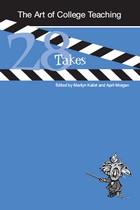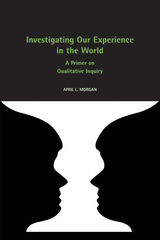

At once accessible and sophisticated, this primer introduces a set of specific principles and procedures designed to promote a deeper understanding of the nuances of human experience and reflection.
The empirical, qualitative approach outlined in this book, which has been refined over the past thirty years at the University of Tennessee, uses disciplined forms of dialogue as the primary means of gathering and assessing information about human experience. Properly known as existential-hermeneutic-phenomenology (or simply phenomenology in everyday usage), this style of scholarly investigation has been applied to illuminate a wide range of research questions in fields such as psychology, child and family studies, marketing, nursing, communications, political science, and more. This book seeks to make this transdisciplinary tradition of research more accessible to a wider audience.
Investigating Our Experience in the World begins with an overview of basic concepts. April L. Morgan provides clear definitions of key terms and succinctly describes how phenomenological research procedures evolved from philosophical explorations of consciousness. Although phenomenological methods are rife with philosophical underpinnings, the author remains focused on describing specific research applications. Each subsequent chapter describes a major stage of a research study. For example, Morgan leads readers through framing the project and undertaking the initial bracketing interview to conducting phenomenological interviews with participants, interpreting texts, thematizing, and developing thematic structure.
Rounding out discussion of the research procedures is a full chapter devoted to writing the research report. The book concludes with a section answering common questions about this style of phenomenological research. Appendices provide a glossary, sample forms, and references for further study.
Aspects of real-world research projects are continually highlighted, illuminating key methodological points. Morgan recognizes the primary investigators and research teams behind such studies for contributing significantly to the development of contemporary phenomenological research methods.
While a member of the political science faculty at the University of Tennessee, Knoxville,
April L. Morgan participated in phenomenology labs housed in the university’s Department of Psychology and in the College of Nursing. Morgan coedited The Art of College Teaching: Twenty-eight Takes, with Marilyn Kallet, and Ethics and Global Politics: The Active Learning Sourcebook, with Lucinda Joy Peach and Colette Mazzucelli.
READERS
Browse our collection.
PUBLISHERS
See BiblioVault's publisher services.
STUDENT SERVICES
Files for college accessibility offices.
UChicago Accessibility Resources
home | accessibility | search | about | contact us
BiblioVault ® 2001 - 2024
The University of Chicago Press









